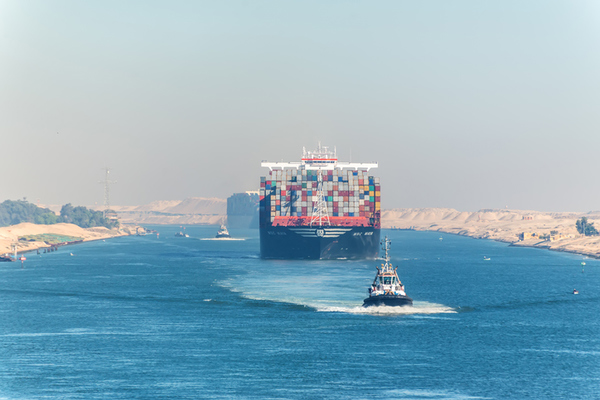Joint effort needed to fix complex shipping crisis - UNCTAD
The United Nations Conference on Trade and Development (UNCTAD) is deeply concerned about escalating disruptions to global trade.
 PHOTO: Large container vessel passing through the Suez Canal, Egypt. Getty Images
PHOTO: Large container vessel passing through the Suez Canal, Egypt. Getty Images
Key global trade routes have been hit by geopolitical tensions affecting shipping in the Black Sea, recent attacks on shipping in the Red Sea impacting the Suez Canal, and the impact of climate change on the Panama Canal. This has created a complex crisis, UNCTAD says.
Global maritime disruptions
Maritime transport is responsible for over 80% of global movements of goods and plays a critical role in international trade. UNCTAD estimates that there has been a 42% decrease in weekly transits through the Suez Canal over the last two months, triggered by the Yemen-based Houthi militant attacks on commercial ships in the Red Sea region in response to the Israel-Palestine conflict in Gaza.
Simultaneously, the Panama Canal faces a 36% reduction in total transits due to diminished water levels, raising concerns about enduring impacts on global supply chains.
In the Red Sea, the Houthi-led attacks on shipping routes have further complicated the crisis. Major players in the shipping industry have temporarily suspended Suez transits for their vessels, resulting in a 67% decrease in weekly container ship transits compared to a year ago. Tanker and gas carrier transits have also declined sharply.
Disruptions and diversions
The global impact of these disruptions is evident as ships seek alternative routes, avoiding the Suez Canal and the Panama Canal. This translates into extended cargo travel distances, escalating trade costs and a surge in greenhouse gas emissions.
Avoiding these vital routes necessitates more days of shipping and increased expenses. The surge in average container spot freight rates, including a historic weekly increase of over $500 in the last week of December, underscores the severity of the situation. Rates from Shanghai to Europe and the US West Coast have shot up by 256% and 162%, respectively.
The combined impact of these disruptions ripples through to elevated food and energy prices. Persistent interruptions, particularly in container shipping, directly threaten global supply chains, potentially leading to delayed deliveries and increased costs. Energy prices see upward pressure because of delayed gas carrier transits, significantly impacting supplies, especially in Europe. The crisis echoes in global food prices, with disruptions in grain shipments from Russia and Ukraine posing risks to food security in receiving countries and regions.
Adaption and cooperation the way ahead
“Developing countries are particularly vulnerable to these disruptions, and UNCTAD remains vigilant in monitoring the evolving situation,” UNCTAD’s head of trade logistics Jan Hoffmann says.
The organisation has called for the shipping industry to adapt to these disruptions. For instance, many shipowners now shy away from Suez Canal transits to avoid Yemeni Houthi militia attacks by the Red Sea, opting instead for the longer route around the Cape of Good Hope.
UNCTAD thinks that geopolitical tensions and climate change-induced impacts on global trade routes compound to make the challenge of tackling them harder. It calls for international cooperation to tide over the impacts from these disruptions.
By Tuhin Roy
Please get in touch with comments or additional info to news@engine.online





